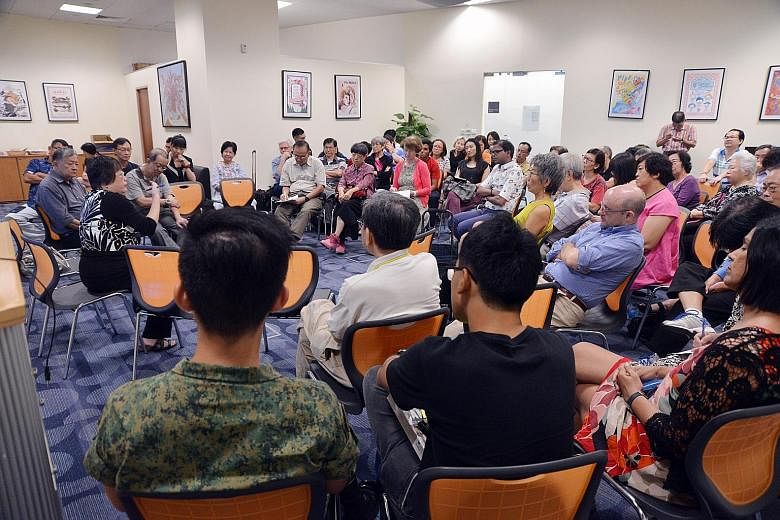The spectacle of a couple verbally abusing an elderly man, after he asked to share a table with them at a hawker centre recently, has angered many who watched a video of it.
In a rare move here, the police have since arrested the couple for causing public nuisance.
The incident was fresh in the minds of the 60 Straits Times readers at The Big Read Meet last Wednesday evening at the National Library Board (NLB) headquarters in Victoria Street.
They were there to discuss India-born author Pankaj Mishra's new book, Age Of Anger, in which he argues that the pursuit of money is the root of all evil because it has fomented individualism such that those who are denied opportunities become furious enough to slam others publicly, if not kill and maim.
The Meet, which this writer moderates, is a popular monthly non-fiction book club run by ST and NLB.
After several readers debated how and why many people seemed to have a sense of "self-entitlement" these days, the sort that demanded that others "make me happy", new Meet member Cheryl Yuan cautioned against confusing "being angry" with "wanting to express anger".
Ms Yuan, 48, said: "It has become almost fashionable to express your anger; you're either in and angry, or you're out."
The designer also wondered why people were slower to compliment a person or company than slam them on social media.
"I once made it a point to compliment my credit card company for a good promotion they had and got eight 'likes' for doing so," she said. That, she added, showed her that others were also thankful for the benefit, but somehow did not feel they needed to say so publicly.
Some readers questioned whether the online community was made up of mostly angry people.
Meet newcomer Joshua Mathew, 18, who is in his second year at Anglo-Chinese Junior College, noted how Facebook and other social media outlets tended to keep "pushing" to their users newsy stories similar to what the users seemed to like in the past, although he noted that "Facebook and others don't admit" to doing so.
"This leads to a continuous flow of views. When people see more and more views that echo their own, they start thinking, 'We must be right'," he added, to applause.
Legal counsel Madan Mohan, 32, who was also new to the Meet, thought that the many instances of spontaneous anger today stemmed from the "distraction and impatience" of pervasive technology and information overload from the Internet.
For example, he noted, the accountant in charge of handing over the result envelope for Best Picture at the Oscars ceremony in February was too busy tweeting to hand over the correct envelope to presenters Warren Beatty and Faye Dunaway, resulting in La La Land being mistakenly announced as the winner instead of Moonlight.
Many readers had bones to pick with Mishra's book, chief among which was the author's lack of facts and figures to back up his main assertion that society today is angrier than ever.
Noting how brutal World War I and II were, German economist and Singapore permanent resident Hans Schniewind said: "Frankly, I don't buy his argument."
Meet regular Jean-Michel Bardin, 64, a Frenchman and retired IT engineer, said he was "not very happy" about Mishra casting the French philosopher Voltaire as villainous and Voltaire's compatriot Jean- Jacques Rousseau as virtuous.
Mr Bardin quoted his late countryman Andre Malraux, an adventurer-turned-minister, who once said: "The 21st century will be spiritual or it will not be."
He added: "If we don't manage to inject spirituality in our lives and societies, humanity will go to its death."
A national serviceman, who asked to be known only as Liao, noted how disapproving society is about "negative emotions" such as sadness. He said he was thankful to his school counsellor for having told him that there is nothing wrong with feeling sad. To nods from readers, he said: "It's not as if it's natural to be happy all the time."
The next Big Read Meet will be on Option B, by Facebook chief operating officer Sheryl Sandberg and psychologist Adam Grant, on May 31 from 6.30pm in the Multi-Purpose Room, B1, Central Public Library, NLB headquarters at 100 Victoria Street. Sign up at any NLB e-Kiosk.


